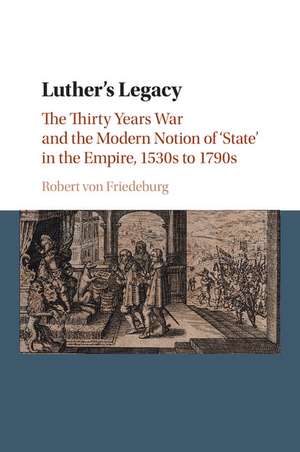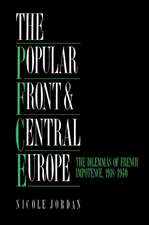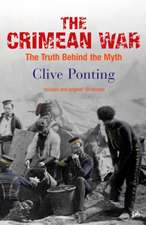Luther's Legacy: The Thirty Years War and the Modern Notion of 'State' in the Empire, 1530s to 1790s
Autor Robert von Friedeburgen Limba Engleză Paperback – 30 aug 2017
| Toate formatele și edițiile | Preț | Express |
|---|---|---|
| Paperback (1) | 325.16 lei 6-8 săpt. | |
| Cambridge University Press – 30 aug 2017 | 325.16 lei 6-8 săpt. | |
| Hardback (1) | 787.78 lei 6-8 săpt. | |
| Cambridge University Press – 3 feb 2016 | 787.78 lei 6-8 săpt. |
Preț: 325.16 lei
Nou
Puncte Express: 488
Preț estimativ în valută:
62.22€ • 64.29$ • 51.76£
62.22€ • 64.29$ • 51.76£
Carte tipărită la comandă
Livrare economică 19 martie-02 aprilie
Preluare comenzi: 021 569.72.76
Specificații
ISBN-13: 9781107530676
ISBN-10: 1107530679
Pagini: 447
Dimensiuni: 153 x 230 x 25 mm
Greutate: 0.59 kg
Editura: Cambridge University Press
Colecția Cambridge University Press
Locul publicării:New York, United States
ISBN-10: 1107530679
Pagini: 447
Dimensiuni: 153 x 230 x 25 mm
Greutate: 0.59 kg
Editura: Cambridge University Press
Colecția Cambridge University Press
Locul publicării:New York, United States
Cuprins
Introduction: Luther's legacy and the 'German' notion of state; 1. Meinecke's riddle: reason of state and Reformation prudence; 2. Royal rights and princely dynasties in late medieval and early modern Germany, fourteenth to early seventeenth centuries; 3. Civil order and princely rights, 1450s to 1580s: the making of the elements; 4. The transformation of ideas on order and the rise of the 'fatherland', 1580s to 1630s: the re-ordering of the elements; 5. The challenge of 'reason of state', 1600s to 1650s; 6. The catastrophe of war and the collapse of relations between princes and vassals; 7. The re-establishing of compromise and the new use of the elements: Seckendorff, Pufendorf and the dissemination of the new concept of 'state'; 8. Readings of despotism: the attack on 'war-despotism' between Bodin and Montesquieu; Conclusion: Luther's legacy: the 'Germaness' of the modern notion of 'state'; Bibliography; Index.
Recenzii
'This book offers an original and striking argument about the emergence of the German concept of the State from conflict and dialogue among princes and their subjects amidst the catastrophic circumstances of the Thirty Years War and its immediate aftermath. Friedeburg breaks new ground by shifting the discussion away from the unsteady development of German liberalism and the supposed uncritical and even enthusiastic embrace of monarchism, which allegedly pushed Germany along a deviant 'special path' away from western democracy and towards Nazism.' Peter H. Wilson, University of Hull
'This work is a tour de force on the development of the modern state in Germany, and a gift for all who are fascinated by the way ideas and passions can transform an empire. It is also a reminder of how voices from the past, and Luther's in particular, continue to speak to critical issues of injustice today.' Brenden Bott, Renaissance and Reformation
'This original interpretation makes the book a major intervention and provides a new way of thinking about the emergence of the state in the German lands.' Martin Christ, European History Quarterly
'This work is a tour de force on the development of the modern state in Germany, and a gift for all who are fascinated by the way ideas and passions can transform an empire. It is also a reminder of how voices from the past, and Luther's in particular, continue to speak to critical issues of injustice today.' Brenden Bott, Renaissance and Reformation
'This original interpretation makes the book a major intervention and provides a new way of thinking about the emergence of the state in the German lands.' Martin Christ, European History Quarterly
Notă biografică
Descriere
A new account of the intellectual debates that created the German notion of the 'modern state' under the Thirty Years War.














